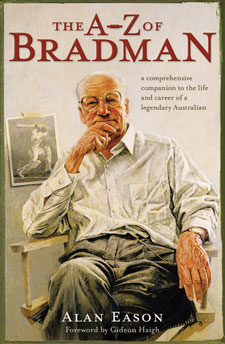As the title suggests, The A"Z of Bradman is less a biography and more a collection of assorted snapshots about Sir Donald Bradman and his world.
Despite the artificial arrangement, the insights of the many people who encountered Bradman provide a fascinating window into the life of this most famous Australian cricketer. An overriding impression " recognised by former leg-spinner Arthur Mailey in 1949 " is how divided people were in their opinions of "the Don'.
 Of course, that Bradman was incomparable as a batsman " players, umpires and observers of his era were unanimously agreed. Several also mention his brilliant mind, which made him an intuitive captain. And 60 years after his retirement, his 99.94 average far surpasses all others. Bradman was voted Wisden's Cricketer of the Century, and with Muhammad Ali and Pele was just one of three athletes in the top 100 people to shape the 20th century as named by International Who's Who.
Of course, that Bradman was incomparable as a batsman " players, umpires and observers of his era were unanimously agreed. Several also mention his brilliant mind, which made him an intuitive captain. And 60 years after his retirement, his 99.94 average far surpasses all others. Bradman was voted Wisden's Cricketer of the Century, and with Muhammad Ali and Pele was just one of three athletes in the top 100 people to shape the 20th century as named by International Who's Who.
But what of Bradman the man? Ray Lindwall states that he never heard Bradman speak a word of criticism about anyone else in the game nor heard him complain about an umpire's decision " high praise indeed! In consenting to tour England in 1948 so as to lift spirits in post-war England, Bradman showed himself the servant. In giving up his administrative duties to help his remarkable wife Jessie care for their polio-afflicted son in 1951, we see Bradman the devoted family man.
On the other hand, teammates "Tiger' O'Reilly, Jack Fingleton and Victor Richardson were certainly no fans. Their dislike seemed to emerge from jealousy over Bradman's promotion to captaincy, his reserved personality and, perhaps, to the pervasive sectarianism of the 1930s. Fingleton lamented Bradman's lack of generosity in failing to share a portion of the £1,000 gift he received from an admirer on the 1930 tour of England. The Don's captain Bill Woodfull was upset with Bradman when on return to Australia, the young star left the team at Perth and travelled across the continent receiving the plaudits that Woodfull felt belonged to the whole team.
Perhaps the most serious stain on Bradman's reputation is the accusation that he "leaked' Woodfull's celebrated rebuke during the infamous "Bodyline' series: "There are two teams out there. One is playing cricket, the other is making no attempt to do so'. The book presents evidence from the journalist's daughter to suggest that Bradman was indeed the culprit, but he always denied it, and Fingleton bore the blame.
After his retirement, Bradman was for many years an influential cricket administrator. Ian Chappell attributed the large-scale defection of Australian players to World Series Cricket in the 1970s to "Bradman's tight-fisted approach to the ACB's (Australian Cricket Board's) money'. His brother Greg also clashed with Bradman over the issue of player payments and found him less than honest in his statements about money held by the ACB.
The A"Z of Bradman confronts us with what Mailey called the paradox of Bradman. In India he is worshipped as the god of cricket. Sunil Gavaskar described him as the "Idol of Idols'. Fifty million Indians watched a replay of his memorial service in 2001. While Don's son John cautioned against enshrining his father, does Paul Zanetti's amusing but irreverent cartoon depicting God asking the Don for his autograph on his arrival in heaven (published just after Bradman's death) find some resonance with Australians?
On the other hand, the book presents sufficient testimony " and perhaps this has been unfairly concentrated in this review " to make the point that like all of us, Bradman had his flaws.
Don Bradman " Incomparable as a batsman, but we dare not compare him to the incomparable God (or vice versa!). For me, the inexorable decline of Bradman's generation (now just a few of the 1948 "Invincibles' remain) is a reminder that "All men are like grass, and all their glory is like the flowers of the field. The grass withers and the flowers fall, because the breath of the LORD blows on them'. Great batsmen, lowly bowlers and cricket lovers alike " what counts on the day we meet the perfect, sovereign Umpire (no disrespect to Simon Taufel) is whether the enduring word of God has transformed us (1 Peter 1).






















